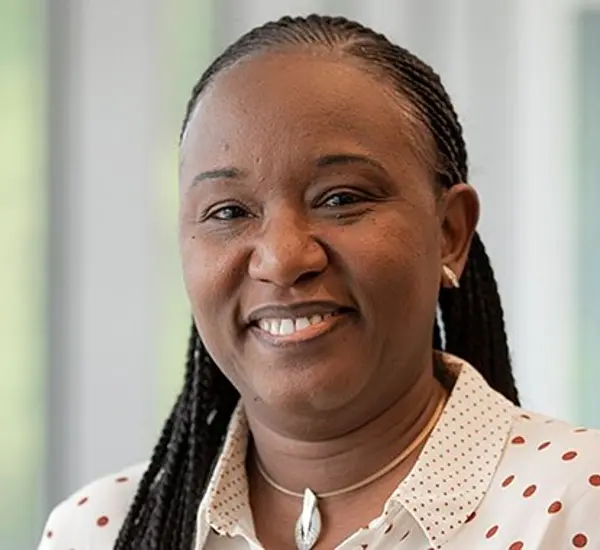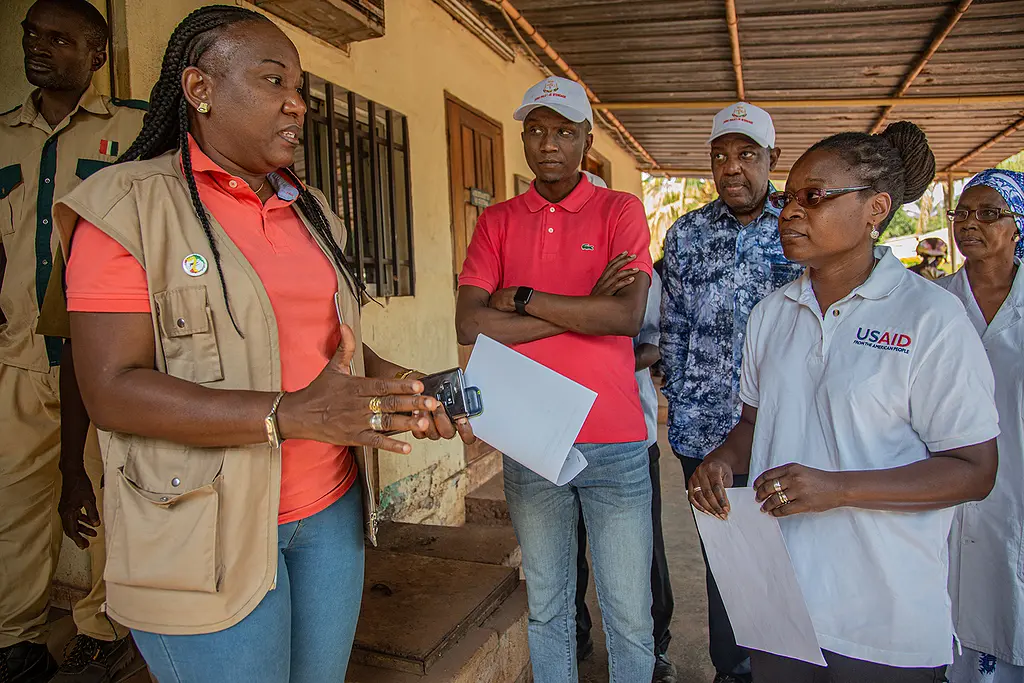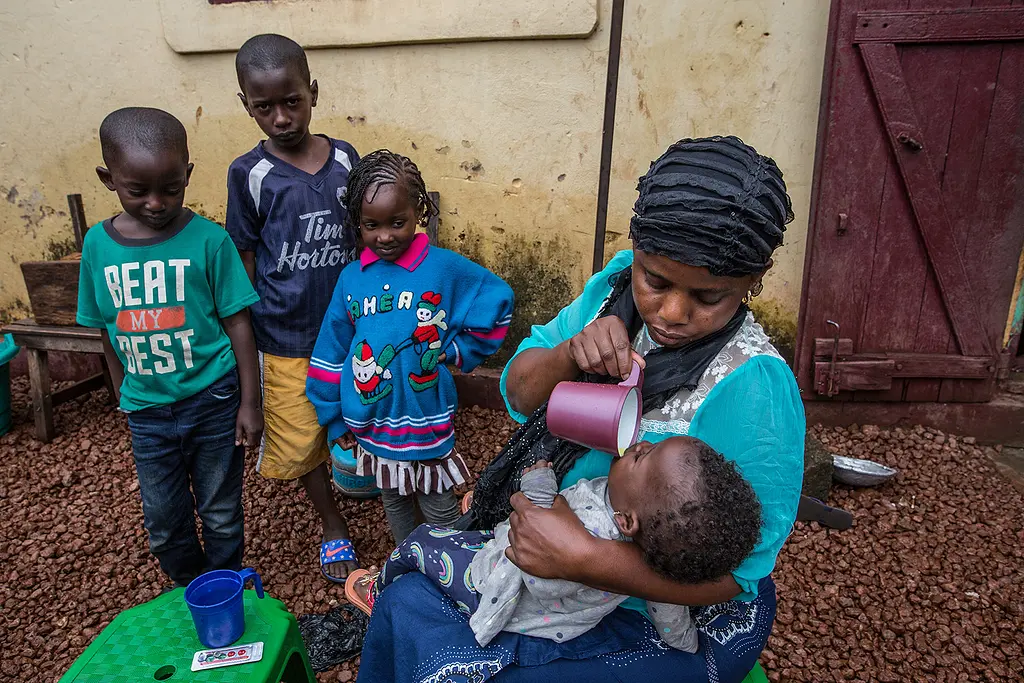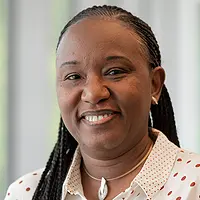
Dr. Aissata Fofana, the Chief of Party for the USAID StopPalu+ project, is a passionate global health advocate who has devoted her career to ending malaria in Guinea.
As the COVID-19 pandemic continues, Aissata reflects on progress against malaria in Guinea and lessons learned from the Ebola epidemic in 2014, shares how StopPalu+ adapted its seasonal malaria chemoprevention campaign during the pandemic, and shares her hope for the continuity of malaria prevention, diagnosis and treatment in spite of challenges.
Please describe your experience leading malaria and health systems strengthening programs in Guinea.
I have always been interested in health since I was a child when my father, a doctor, told me how he took care of his patients and shared the joys and difficulties of being a doctor in Guinea. I decided to be a doctor to be like him. After my medical studies, I worked at the main national hospital in Conakry and every day I saw many patients coming to the hospital late and dying because there was nothing left to do for them. I was very frustrated that these people could have been saved if they had come a little earlier or if they had used preventive means to avoid these diseases. It was this that prompted me to devote myself to improving health at the grassroots level by strengthening the underlying health system.
I have been working on health systems strengthening projects in Guinea since 2004 and joined RTI in 2007 to manage the health component of Faisons Ensemble, a multi-sectoral governance project funded by USAID. In 2011, the President’s Malaria Initiative (PMI) expanded its support to Guinea and used Faisons Ensemble as the main mechanism to support the national malaria control program (NMCP) prior to the creation of a bilateral malaria project. Then in 2013, RTI was awarded StopPalu, the first bilateral malaria project in Guinea and the predecessor project to StopPalu+. I have served as Chief of Party for both projects and am proud to note that many of our StopPalu+ staff started with us under Faisons Ensemble. Through StopPalu and StopPalu+ over the past seven years, we have supported the Ministry of Health (MoH) and NMCP to increase access to malaria prevention and treatment, strengthen the capacity of health providers and community health workers to prevent and manage malaria cases, and improve data quality and monitoring, evaluation, research and coordination.
What progress have you seen since you began this work?
Through StopPalu and StopPalu+ we have worked in 14 of Guinea’s 38 districts and have built strong reputations in these communities that have allowed us to achieve significant progress in malaria control over the last decade. In collaboration with the MoH and NMCP, we have distributed more than 9.3 million long lasting insecticide-treated nets (LLINs) through three mass campaigns; trained and supervised more than 2,000 community health workers on malaria diagnosis and treatment; organized and supported three annual seasonal malaria chemoprevention (SMC) campaigns, providing essential antimalarial medicines each time to more than 300,000 children under five across seven districts; and drastically improved the completeness of malaria data from 30% in 2013 to 100% in 2020. The ability to report and analyze quality and accurate malaria data has been critical to improving the sustainability and success of malaria interventions in Guinea. We have also improved access to malaria diagnostics and treatments - in FY 2020, we were able to provide diagnostic tests to 98% of suspected malaria cases and antimalarial treatments to 97% of positive cases in districts supported by StopPalu+.
We have strengthened the involvement and commitment of local authorities, traditional and religious leaders, artists, youth and women associations and communities in the fight against malaria, including training more than 1,000 religious leaders on malaria control messages and organizing a peer education program for malaria control in schools. In addition, in partnership with the NMCP, we established technical working groups that facilitate the planning, execution and coordination of malaria control activities across the country and created an insectarium and a molecular biology laboratory at the University of Conakry to conduct entomological surveillance. We also support annual studies in order to detect possible resistance to artemisinin-based combination therapy (ACT).
Thanks to all of this important work and a strong commitment from the MoH and local stakeholders, we have seen the national malaria prevalence decrease from 44% in 2013 to 15% in 2016.

What are some of the lessons learned from Guinea’s experience with Ebola in 2014? How has that helped the country adapt to COVID-19?
Guinea has learned several lessons from the fight against Ebola. First, to fight epidemics effectively, we must build on the existing structures and organizations already present and active in-country. These are well-known and respected within the communities where they operate, so their advice and services are more easily accepted. During the Ebola epidemic, we noticed that many new organizations were created from scratch or came from abroad. Most of them did not have any staff, infrastructure, equipment, local network, or field experience. Despite the emergency, they were not immediately effective because they had to recruit, develop their working plan, communicate with all other stakeholders, and so on. This resulted in a delayed response, waste of funds, confusion, difficulty in coordinating activities, and demotivation of the organizations already supporting the MoH.
During infectious disease outbreaks like Ebola and now COVID-19, it is important to ensure the continuity of essential health services so that endemic diseases, such as malaria, do not cause more deaths. Communication activities and proper messaging in communities are critical. We learned during Ebola that groups of influential people vary from one district to another. In order to achieve desired behavior change and trust it is important to know these groups and involve them in the response.
Finally, integrated and participatory planning helps to ensure that resources are used efficiently, and important activities are not neglected. These lessons have enabled Guinea to better manage the COVID-19 pandemic with the establishment of coordination units at different levels of government, use of existing structures at the regional and district levels, and collaborative planning of activities, including the purchase of protective equipment and materials.
Seasonal malaria chemoprevention (SMC) is a critically important intervention that protects children under five from contracting malaria. How has StopPalu+ adapted SMC during the pandemic to ensure the safe delivery of these preventive treatments?
To carry out the 2020 SMC campaign in the context of COVID-19, StopPalu+ adapted before and after the campaign based on the recommendations of the World Health Organization (WHO) and PMI. Before the campaign, we trained all 3,000 drug distributors and supervisors on COVID-19 prevention measures. Each training session had less than 30 participants and all participants had their temperature checked, washed their hands before entering, and wore masks. We revised communication materials to include COVID-19 prevention measures, increased communication activities and decentralized advocacy meetings to reduce the number of participants at the district level. All distributors and supervisors received prevention equipment.
During the campaign, we ensured that there was no direct contact between the distributors and household members. Typically the distributors provide the utensils and administer the first dose of the drug, but for this campaign the mothers used their own spoons and cups to administer the drug, washed their hands with soap before administering the first dose to their children under the supervision of the distributors, and then filled out the distribution cards.

These safety measures helped the project to successfully implement all four rounds of SMC from July to October while reaching 95 to 99% of children under five.
We also learned some lessons that will be used for future SMC campaigns. We noticed that when mothers gave the drugs to the children there were fewer vomiting instances reported. It took less time to administer the drugs, the children felt more comfortable, and using household utensils reduced the cost and logistics required to transport of all the cups and spoons. Finally, decentralizing advocacy meetings helped involve more influential people at the local level who played an important role in reducing resistance to the campaign.
What are your recommendations for ensuring the continuity of malaria prevention, diagnosis and treatment going forward? What gives you hope?
Since the declaration of the pandemic in March 2020, health providers and community health workers in Guinea have adopted safety measures and developed methods for continuing to deliver essential services in this difficult and stressful context and their fear of contamination has decreased. However, we must continue to equip our frontline workers with adequate protective equipment to continue to motivate and protect these important health actors. It is also critical to sensitize the population to ensure they keep seeking diagnosis, care and treatment at health facilities when necessary.
My hope for the future rests on three pillars: the thousands of community health workers that are motivated and committed to increasing access to quality health services in their communities; the Guinean community that wants to be in charge of its health; and the partners and donors who continue to support Guinea on its journey to self-reliance.
